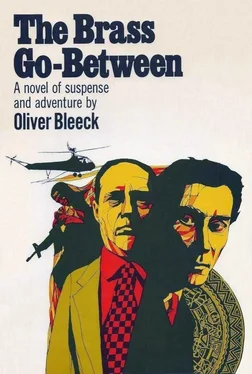Oliver Bleeck - Brass Go-Between
Здесь есть возможность читать онлайн «Oliver Bleeck - Brass Go-Between» весь текст электронной книги совершенно бесплатно (целиком полную версию без сокращений). В некоторых случаях можно слушать аудио, скачать через торрент в формате fb2 и присутствует краткое содержание. Город: New York, Год выпуска: 1969, Издательство: William Morrow, Жанр: Детектив, на английском языке. Описание произведения, (предисловие) а так же отзывы посетителей доступны на портале библиотеки ЛибКат.
- Название:Brass Go-Between
- Автор:
- Издательство:William Morrow
- Жанр:
- Год:1969
- Город:New York
- ISBN:нет данных
- Рейтинг книги:3 / 5. Голосов: 1
-
Избранное:Добавить в избранное
- Отзывы:
-
Ваша оценка:
- 60
- 1
- 2
- 3
- 4
- 5
Brass Go-Between: краткое содержание, описание и аннотация
Предлагаем к чтению аннотацию, описание, краткое содержание или предисловие (зависит от того, что написал сам автор книги «Brass Go-Between»). Если вы не нашли необходимую информацию о книге — напишите в комментариях, мы постараемся отыскать её.
Brass Go-Between — читать онлайн бесплатно полную книгу (весь текст) целиком
Ниже представлен текст книги, разбитый по страницам. Система сохранения места последней прочитанной страницы, позволяет с удобством читать онлайн бесплатно книгу «Brass Go-Between», без необходимости каждый раз заново искать на чём Вы остановились. Поставьте закладку, и сможете в любой момент перейти на страницу, на которой закончили чтение.
Интервал:
Закладка:
I read the typed message three times and then picked up the phone and placed a person-to-person call to Frances Wingo in Washington. It went through quickly enough when I identified myself to her secretary.
“Good morning,” she said.
“Good morning,” I said. “I have some news.”
“Yes?”
“I’ve just received a message from whoever has the shield. They want the money Thursday. That’s tomorrow.”
“All right,” she said. “Where shall I bring it?”
“You?”
“I believe it to be my responsibility.”
“I won’t dispute that. I just thought it might be a little heavy for you. They want it in used tens and twenties and that much money weighs around fifty pounds.”
“I’m sure I can manage,” she said. “Where shall I bring it?”
“To my hotel, the Adelphi.” I gave her the address.
“What time?”
“Any time before three,” I said. “If you make it before two, we can have lunch.”
She ignored the invitation. Perhaps that’s the form for widows of four weeks. “Will you recover the shield tomorrow?” she said.
“I don’t know. It’s possible.”
“Is it probable?”
“Again, I don’t know. I have no idea whom I’m dealing with. The trip down the Jersey Turnpike may be just a dry run to find out how well I follow instructions. Or they may be in a hurry for the money and want to get rid of the shield. You’ve got to remember that it’s not something that they can carry around in their hip pocket or unload at the corner pawnshop. There’s an extremely limited market.” I started to tell her about the fifty thousand that I had been offered by Conception Mbwato, but I decided not to because it was all too complicated and there was no point in listening to questions for which I had no answers.
“I’ll call Mr. Spencer to arrange for the money,” she said.
“When you get through with that, would you also call Lieutenant Demeter and fill him in on what’s happened?”
“I didn’t think that you wanted to involve the police.”
“I’m not involving them; I’m just staying in touch with Demeter because I said that I would.”
“All right,” she said. “I’ll call him.”
“What time shall I expect you tomorrow?”
“After two.”
“That’s what I thought,” I said.
When Frances Wingo hung up in my ear, I decided that we probably would never be close friends, but there seemed to be an excellent chance that we might become polite enemies if either of us wanted to go to the bother. I thought — or brooded — about this during the time it took to find a can of tomato soup and run it through the electric opener. I then poured the soup into a pot, added a half can of water, and placed it over one of the two burners that the Pullman kitchen offered. While the soup heated, I looked up a number in the phone book and dialed it. When a man’s voice said, “Albert Shippo and Associates,” I asked for Mr. Shippo.
“I’m Shippo.”
“My name’s Philip St. Ives. I’d like to see you.”
“What about?”
“Johnny Parisi suggested that I call. He thought you might have something I could use.”
“Parisi, huh?”
“Parisi,” I said.
“You a wholesaler?”
“No.”
“Well, I tell you, I don’t do much retail any more, but if Parisi said to call, then I guess it’s okay. You wanta come over?”
“This afternoon all right?”
“Anytime,” Shippo said. “I’m not doing anything anyway except sitting here trying out a new cure on my athlete’s foot.”
“I’ll be there at two-thirty.”
“Two-thirty, three-thirty, it don’t matter,” he said. “I ain’t going nowhere.”
A few minutes after I got through talking to Shippo, the soup was heated so I took it off the burner, poured it into a bowl, found a box of crackers and a bottle of beer, and laid my solitary midday meal on the hexagonal table that had been designed to comfortably accommodate six at poker.
Albert Shippo and Associates’ office was at East 24th Street on the eighth floor of the George Building, which was as unimpressive as its name. There were two elevators, but only one of them was working under the captaincy of a shabbily dressed old man with a face the color and texture of a worn peach pit and pure white hair that hung down to his shoulders. He jerked the handle when I said “eight,” and when the door didn’t close, he kicked it with a scuffed cowboy boot. The elevator responded, grudgingly, it seemed, and we creaked upward.
At the second floor, he turned to look at me. “Don’t get any ideas, rube. I ain’t one of them just because of the long hair.”
“I didn’t think that you were.”
“Some folks get the wrong idea. I rode with Bill, you know. Madison Square Garden, nineteen-ought-nine.”
“Bill?”
“Bill Cody, you dumb shit. William Frederick Cody. Buffalo Bill.”
“You were in his Wild West show, huh?”
“Damned right I was. We all wore our hair long like this from Bill on down. Now folks think I’m one of them Village punks, but I ain’t. I’m part Indian, too. Chickasaw on my mother’s side.”
“You must have some great memories,” I said as the elevator croaked to a stop at the eighth floor.
“They ain’t so hot,” the old man said.
Eight-two-nine was the number of Albert Shippo and Associates and it was down the hall, past the skip-tracer, the direct mail firm, the manufacturer’s representative, and three empty offices. Albert Shippo and Associates was lettered on the pebbled-glass door and another message on a typed card that was stuck to the glass with Scotch tape read KNOCK BEFORE ENTERING. I knocked and a voice said come in. Inside there was a scarred golden oak desk positioned in front of the single window with a dark green shade. The window needed washing. There were four metal filing cabinets and two chairs. One of the chairs, also golden oak, was in front of the desk. The other one was behind it and contained Albert M. Shippo and, as far as I could tell, all of the associates.
“You the guy who called?” the man behind the desk said.
“Yes.”
“Sit down,” he said. “I’m Shippo.” He was about forty-five with a double chin and a smooth bald head which he drew attraction to with a set of mutton-chop sideburns that fanned out over plump cheeks well below the lobes of his ears. Thick black horn-rimmed glasses covered his eyes, which seemed disappointed when they looked at me, but they may have looked at everything like that. He had a small pink mouth below an ordinary pink nose, and the upper lip of the mouth formed what they used to describe as a perfect Cupid’s bow. Below his double chins was a white shirt collar that seemed too small and a blue and white striped tie that was too narrow.
I sat down and looked around the office. There was a black telephone on the desk, but no calendar on the wall. In fact, there was nothing to indicate whether Shippo had moved in that morning or six years before.
“Like I said over the phone, I’m a jobber and don’t do much retail business any more,” he said. “But since Johnny Parisi told you to call — well…” He let the sentence fade away as if it were just too much trouble to complete.
“I don’t know if you got my name right,” I said. “It’s St. Ives. Philip St. Ives.”
Shippo nodded. “I got it okay.”
“You called Parisi about me six or seven weeks ago.”
“I make a lot of calls. Some guy calls me and says, ‘Hey, Al, whaddya know about so and so?’ and I say, ‘I don’t know nothing about so and so,’ and the guy says, ‘Can you find out?’ and I say, ‘Okay, it’ll cost you ten bucks.’ Or twenty or thirty or whatever I can hit him up for. So I call around and find out what I can and then I call the guy back and say, ‘So and so’s okay’ or ‘So and so’s a bum who owes everybody in town.’ But that ain’t my main business. Like I said, I’m a jobber.”
Читать дальшеИнтервал:
Закладка:
Похожие книги на «Brass Go-Between»
Представляем Вашему вниманию похожие книги на «Brass Go-Between» списком для выбора. Мы отобрали схожую по названию и смыслу литературу в надежде предоставить читателям больше вариантов отыскать новые, интересные, ещё непрочитанные произведения.
Обсуждение, отзывы о книге «Brass Go-Between» и просто собственные мнения читателей. Оставьте ваши комментарии, напишите, что Вы думаете о произведении, его смысле или главных героях. Укажите что конкретно понравилось, а что нет, и почему Вы так считаете.












